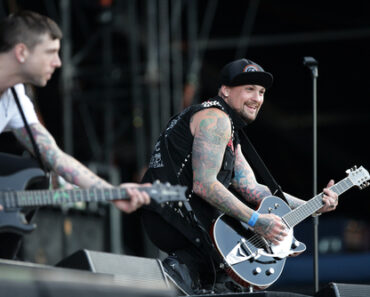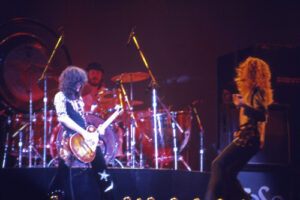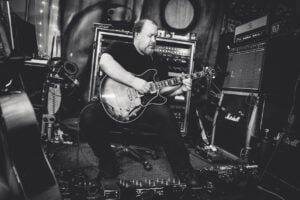
Feature Photo: Frank Schwichtenberg, CC BY-SA 4.0 <https://creativecommons.org/licenses/by-sa/4.0>, via Wikimedia Commons
The band’s history spans nearly five decades, during which over twenty musicians have contributed to its sound across various incarnations. Multiple hiatuses occurred, most notably from 1989 to 1994 and again from 2001 to 2003, often stemming from interpersonal conflicts between founding members Don Dokken and George Lynch. Despite these challenges, the band continued to evolve, with some members departing to pursue other projects while new talent joined to carry forward the Dokken legacy.
Throughout its existence, Dokken has maintained a core identity centered around Don Dokken’s distinctive vocals and the band’s signature blend of melodic hard rock and heavy metal. The group’s ability to survive lineup changes, industry shifts, and internal disputes demonstrates the enduring appeal of their music and the dedication of both longtime and newer members to preserve the band’s artistic vision. From their early German tours to recent releases, Dokken remains an active force in rock music, continuing to tour and record with both veteran and fresh talent.
Don Dokken
Don Dokken stands as the sole constant member throughout the band’s entire history, serving as the driving force behind the group since its inception in 1976. Originally forming the band as Airbourne, he transitioned to the Dokken name in 1978 and has maintained his role as lead vocalist and rhythm guitarist across all lineup configurations. His contributions span every studio album from the debut Breaking the Chains through the most recent Heaven Comes Down in 2023, establishing him as the band’s creative anchor and primary songwriter.
During the band’s peak years from 1983 to 1989, Don Dokken’s vocal style became synonymous with the melodic hard rock sound that defined their most successful albums, including Tooth and Nail, Under Lock and Key, and Back for the Attack. His ability to blend powerful vocal delivery with accessible melodies helped establish Dokken as a major force in the 1980s metal scene. Following the band’s initial breakup in 1989, he pursued solo work, releasing Up from the Ashes in 1990, which showcased his versatility as a performer beyond the Dokken framework.
Throughout his career, Don Dokken has navigated numerous lineup changes and industry challenges while maintaining his commitment to the band’s musical identity. His leadership has been instrumental in multiple reunions, including the notable 2016 classic lineup reunion for shows in Japan. Beyond his work with Dokken, he has collaborated with various musicians and maintained an active touring schedule, demonstrating his enduring passion for live performance and connection with fans worldwide.
George Lynch
George Lynch joined Dokken in July 1981 alongside drummer Mick Brown, bringing his distinctive guitar style that would become integral to the band’s signature sound. His initial tenure lasted through the band’s most commercially successful period, contributing lead guitar work to classic albums including Breaking the Chains, Tooth and Nail, Under Lock and Key, Back for the Attack, and Beast from the East. Lynch’s technical proficiency and melodic sensibilities helped define the band’s approach to heavy metal during their peak years.
Following the band’s breakup in 1989, Lynch returned for reunion periods, notably from 1994 to 1997, during which he recorded Dysfunctional and Shadowlife. His guitar work on these albums demonstrated his continued evolution as a musician while maintaining the core elements that made his contributions to Dokken so distinctive. A brief 2016 reunion tour in Japan allowed longtime fans to witness the classic lineup perform together once more, resulting in the live album Return to the East Live.
Outside of Dokken, Lynch has maintained a prolific career with bands including Lynch Mob, which he formed after leaving Dokken in 1989. His work with Lynch Mob has produced multiple albums and established him as one of the premier guitarists in hard rock and heavy metal. Lynch has also collaborated with numerous other artists and projects, including T&N with former Dokken bassist Jeff Pilson and drummer Mick Brown. Since 2020, he has served as a touring guitarist for Dokken, maintaining his connection to the band while pursuing his various other musical endeavors.
Jon Levin
Jon Levin assumed the lead guitar position in Dokken in late 2003, bringing his experience from the German heavy metal band Warlock to fill the void left by previous guitarists. His debut with the band came on the 2004 album Hell to Pay, where he demonstrated his ability to adapt his playing style to fit Dokken’s established sound while bringing his own musical perspective to the group. Since joining, Levin has become the band’s longest-serving lead guitarist outside of George Lynch’s various tenures.
Throughout his time with Dokken, Levin has contributed to multiple studio albums including Lightning Strikes Again in 2008, Broken Bones in 2012, and the most recent Heaven Comes Down in 2023. His consistent presence has provided stability during a period when the band experienced changes in other positions, particularly in the bass guitar role. Levin also contributed overdubs to The Lost Songs: 1978-1981, a collection of early Dokken material released in 2020.
Prior to joining Dokken, Levin gained recognition through his work with Warlock, the German heavy metal band led by Doro Pesch. His experience in the European metal scene brought a different perspective to Dokken’s sound while respecting the band’s established musical identity. Levin’s ability to maintain the technical standards expected of a Dokken guitarist while contributing his own musical ideas has made him an integral part of the band’s current incarnation.
Chris McCarvill
Chris McCarvill joined Dokken as bassist in 2015, bringing stability to a position that had seen frequent changes throughout the band’s history. His tenure began following the brief stint of Mark Boals, and he quickly established himself as a reliable foundation for the band’s rhythm section. McCarvill’s bass work can be heard on the band’s most recent studio album, Heaven Comes Down, released in 2023, where he contributed both bass guitar and backing vocals.
His arrival coincided with a period of renewed activity for Dokken, as the band continued touring and working on new material. McCarvill’s playing style fits well within Dokken’s established sound while bringing his own musical background to the group. His contributions extend beyond bass playing to include backing vocals, adding depth to the band’s live performances and studio recordings.
Before joining Dokken, McCarvill had experience in various musical projects, though his work with Dokken represents his highest-profile musical association. His commitment to the band has provided the stability needed for continued touring and recording, making him an essential part of Dokken’s current lineup. His collaboration with the other current members has helped maintain the band’s musical momentum during this later period of their career.
Bill “BJ” Zampa
Bill “BJ” Zampa officially joined Dokken as drummer in 2019, though he had previously served as a touring drummer for the band from 2008 to 2010. His permanent appointment came following Mick Brown’s announcement that he was taking a break from performing, which eventually became a full retirement from the band. Zampa brought his experience from House of Lords and other musical projects to fill the crucial drummer position.
Since becoming a full member, Zampa has contributed to studio recordings including overdubs on “The Lost Songs: 1978-1981” and full participation in “Heaven Comes Down” in 2023. His drumming style has adapted well to Dokken’s established sound while bringing his own technical approach to the rhythm section. Zampa also provides backing vocals, adding to the band’s vocal arrangements during live performances and studio work.
His previous experience as a touring member gave him valuable familiarity with Dokken’s catalog and performance expectations, making his transition to permanent member relatively seamless. Zampa’s work with House of Lords and other projects has established him as a skilled drummer capable of handling the demands of professional touring and recording. His presence has allowed Dokken to maintain their performance schedule and continue creating new music during this current phase of the band’s evolution.
Juan Croucier
Juan Croucier holds the distinction of being one of Dokken’s earliest members, joining the original Airbourne lineup in 1976 and remaining through various iterations until 1983. His bass playing appears on several early recordings, including “Back in the Streets” and the original version of “Breaking the Chains.” Croucier’s tenure with Dokken was marked by his versatility, contributing not only bass guitar but also backing vocals and even co-lead vocals during certain periods.
His time with Dokken was interrupted by various departures and returns, often coinciding with the band’s evolving lineup and recording commitments. Croucier’s final departure from Dokken in 1983 came as he committed full-time to Ratt, where he would achieve significant commercial success. His bass work during Dokken’s formative years helped establish the foundation for the band’s sound development.
Outside of Dokken, Croucier is best known for his work with Ratt, where he served as bassist and contributed to their most successful albums during the 1980s hair metal boom. His experience with Ratt brought him widespread recognition and commercial success, making him one of the most recognizable musicians from Dokken’s early period. Croucier’s contributions to “The Lost Songs: 1978-1981” compilation in 2020 provided fans with previously unreleased material from his time with the band.
Mick Brown
Mick “Wild” Brown joined Dokken in July 1981 alongside George Lynch and became one of the band’s most enduring members, serving as drummer for nearly four decades. His powerful drumming style became integral to Dokken’s sound throughout their most successful period, contributing to classic albums from “Breaking the Chains” through multiple reunion efforts. Brown’s consistency behind the drum kit provided stability during various lineup changes affecting other positions.
During his extensive tenure, Brown contributed not only drums but also backing vocals and occasional lead vocals, adding depth to the band’s vocal arrangements. His participation in reunion tours and recording sessions demonstrated his commitment to the Dokken legacy, even during periods when the band was inactive. Brown’s drumming can be heard on the majority of Dokken’s studio albums and live recordings, making him one of the most recorded members in the band’s history.
After announcing his intention to take a break from live performance in 2019, Brown officially retired from active duty with Dokken, ending one of the longest tenures in the band’s history. His influence on Dokken’s sound cannot be overstated, as his drumming style became synonymous with the band’s approach to heavy metal and hard rock. Beyond Dokken, Brown has participated in various side projects, including T&N with former bandmates George Lynch and Jeff Pilson, continuing his musical career outside the main band structure.
Jeff Pilson
Jeff Pilson replaced Juan Croucier as Dokken’s bassist in 1983 and remained with the band through their most commercially successful period until 1989. His bass playing and backing vocals were crucial elements in albums including “Tooth and Nail,” “Under Lock and Key,” “Back for the Attack,” and “Beast from the East.” Pilson’s musical contributions extended beyond bass playing to include keyboards and occasional lead vocals, demonstrating his versatility as a musician.
Following the band’s initial breakup, Pilson returned for reunion periods from 1994 to 2001, contributing to albums such as “Dysfunctional,” “Shadowlife,” “Erase the Slate,” and “Live from the Sun.” His presence during these reformation periods provided continuity and helped maintain the band’s musical identity during personnel changes. Pilson’s final departure in 2001 came as he focused on other musical projects, though he returned for the 2016 Japan reunion tour.
Outside of Dokken, Pilson has maintained a diverse and successful career, including work with Dio, where he served as bassist and contributed to several albums. His involvement with Foreigner as bassist and his various solo projects have established him as one of the most respected bass players in hard rock and heavy metal. Pilson’s production work and songwriting contributions to various artists have further cemented his reputation as a multifaceted musician beyond his performance capabilities.
John Norum
John Norum served two separate terms as Dokken’s lead guitarist, first from 1997 to 1998 and again from 2001 to 2002. His guitar work appears on the album “Long Way Home,” where he demonstrated his ability to adapt his playing style to fit Dokken’s established sound. Norum’s tenure with Dokken came during a period of significant lineup changes as the band sought to maintain stability following George Lynch’s departure.
Between his two periods with Dokken, Norum was temporarily replaced by Reb Beach, but returned to complete recording projects and tour commitments. His departure in 2002 was attributed to tensions with Don Dokken, though he maintained professional standards throughout his involvement with the band. Despite the relatively brief duration of his membership, Norum’s contributions helped bridge important transitional periods in Dokken’s history.
Norum is best known as the original guitarist for Europe, where he contributed to their breakthrough album “The Final Countdown” and established himself as a prominent figure in Swedish hard rock. His work with Europe both before and after his time with Dokken represents his most significant musical achievements. Norum’s solo career and various collaborations have maintained his profile in the international rock scene, making his connection to Dokken an interesting chapter in his broader musical journey.
Reb Beach
Reb Beach served as Dokken’s lead guitarist from 1998 to 2001, contributing to the albums “Erase the Slate” and “Live from the Sun.” His guitar work during this period demonstrated his technical proficiency and ability to adapt his playing style to fit within Dokken’s established musical framework. Beach’s tenure provided stability during a transitional period when the band was working to maintain momentum following various lineup changes.
His role in Dokken involved both lead and rhythm guitar parts, as well as backing vocals, contributing to the band’s overall sound during live performances and studio recordings. Beach’s experience from his previous work with Winger and other projects brought a professional approach to his time with Dokken. His departure in 2001 coincided with John Norum’s return to the band, marking another transition in the guitarist position.
Outside of Dokken, Beach is well known for his work with Winger, where he served as guitarist during their most successful period in the late 1980s and early 1990s. His subsequent work with Whitesnake has established him as one of the premier guitarists in hard rock and heavy metal. Beach’s solo work and various collaborations have maintained his reputation as a versatile and skilled musician capable of adapting to different musical contexts while maintaining his distinctive playing style.
Barry Sparks
Barry Sparks joined Dokken as bassist in 2001, initially as a session replacement for Jeff Pilson, but quickly became a full-time member. His bass work appears on albums including “Long Way Home,” “Hell to Pay,” and “Lightning Strikes Again,” where he demonstrated his ability to provide solid foundational support for the band’s sound. Sparks also contributed backing vocals and keyboards, showing his versatility as a multi-instrumentalist.
His tenure with Dokken lasted until 2009, during which he became an integral part of the band’s rhythm section working alongside drummer Mick Brown. Sparks temporarily left in 2009 to tour with UFO, with Sean McNabb filling in during his absence. When personal commitments required him to step back from touring duties in 2010, McNabb remained as his permanent replacement.
Beyond his work with Dokken, Sparks has maintained an active career as a session musician and has worked with various artists in the hard rock and heavy metal genres. His experience with UFO and other established acts has made him a sought-after bass player for both touring and recording situations. Sparks’ professional approach and reliable performance made him a valued member during his time with Dokken, contributing to the band’s stability during an important period of their career.
Sean McNabb
Sean McNabb served as Dokken’s bassist from 2009 to 2014, initially joining as a temporary replacement for Barry Sparks before becoming a permanent member. His bass work can be heard on “Greatest Hits” bonus tracks and the full album “Broken Bones” in 2012. McNabb’s playing style fit well within Dokken’s established sound while bringing his own experience from previous musical projects.
During his tenure with Dokken, McNabb provided both bass guitar and backing vocals, contributing to the band’s live performances and studio recordings. His professional approach and reliable performance helped maintain stability in the rhythm section during a period of continued touring and recording activity. McNabb’s departure in 2014 was attributed to his inability to commit full-time to Dokken due to other professional obligations.
Prior to joining Dokken, McNabb had gained experience with Great White and other rock acts, establishing himself as a capable bassist in the hard rock genre. His work with various artists both before and after his time with Dokken has maintained his presence in the rock music scene. McNabb’s contributions during his five-year tenure helped bridge an important transitional period in Dokken’s ongoing evolution.
Mark Boals
Mark Boals had a brief but notable tenure with Dokken, first contributing backing vocals to “Broken Bones” in 2012, then serving as bassist from 2014 to 2015. His involvement with the band came during a period of transition in the bass position, following Sean McNabb’s departure. Boals’ experience as both a vocalist and bassist made him a versatile addition to the band during this transitional period.
His work as bassist was relatively short-lived, lasting only about a year before being replaced by Chris McCarvill in 2015. Despite the brief duration of his bass playing role, Boals demonstrated his adaptability as a musician capable of transitioning between different instrumental roles within a band context. His vocal contributions to “Broken Bones” showcased his abilities in that area as well.
Outside of Dokken, Boals is primarily known for his work as a vocalist with Yngwie Malmsteen, where he contributed to several albums during different periods of that guitarist’s career. His vocal style and range made him a suitable choice for the demanding technical requirements of Malmsteen’s neoclassical metal approach. Boals’ diverse musical experience, including work with various other artists, established him as a versatile performer capable of adapting to different musical styles and requirements.
Bobby Blotzer
Bobby Blotzer was among Dokken’s earliest members, serving as drummer during the original Airbourne period from 1976 to 1978 and returning briefly in 1981. His drumming appears on portions of “Breaking the Chains,” specifically tracks 6-8, marking his contribution to the band’s debut album recording sessions. Blotzer’s early involvement with Dokken established him as part of the band’s foundational period before they achieved wider recognition.
His departure from Dokken in the early 1980s coincided with his commitment to Ratt, where he would achieve significant commercial success as that band’s drummer throughout their peak years. Blotzer’s work with Ratt during the 1980s hair metal boom brought him widespread recognition and established him as one of the prominent drummers of that era. His brief returns to Dokken represented his connection to his earliest professional musical experiences.
Outside of his work with both Dokken and Ratt, Blotzer has maintained an active career in rock and metal music, participating in various projects and reunions. His drumming style, developed during the early days of the Los Angeles metal scene, influenced the sound of both bands during their formative periods. Blotzer’s contributions to the early development of both Dokken and Ratt make him a significant figure in the history of 1980s American heavy metal.
Paul Goldwin
Paul Goldwin holds the distinction of being Dokken’s first lead vocalist during the brief Airbourne period in 1976, before Don Dokken assumed vocal duties. His time with the band was extremely short, lasting only during the initial formation period before the group underwent its first significant lineup change. Goldwin’s contribution to the band was primarily as the original frontman concept before Don Dokken established his role as both vocalist and band leader.
No recordings exist featuring Goldwin’s vocal contributions, as his departure preceded any studio work or significant musical development by the group. His role in Dokken’s history is primarily historical, representing the very earliest incarnation of what would eventually become the successful heavy metal band. The transition from Goldwin to Don Dokken as vocalist marked the beginning of the band’s true musical identity.
Information about Goldwin’s musical career outside of his brief time with the early version of Dokken is limited, suggesting that his involvement with the band may have been one of his few documented musical associations. His place in Dokken’s history serves as a reminder of the experimental nature of band formation during the mid-1970s rock scene in Los Angeles. The brief nature of his involvement demonstrates how quickly lineup changes occurred during the band’s formative period.
Warren DeMartini
Warren DeMartini had a brief but significant involvement with Dokken in late 1982, contributing guitar work to one track on the re-recorded version of “Breaking the Chains.” His participation came during a period when the band was experimenting with different lineups while working to establish their definitive sound. DeMartini’s guitar work on track 10 of the 1983 release represents his only recorded contribution to Dokken’s catalog.
His time with Dokken was extremely limited, lasting only a few months during a transitional period when the band was seeking stability in their guitarist position. DeMartini’s involvement occurred between George Lynch’s departures and returns, highlighting the fluid nature of Dokken’s lineup during this crucial period. His brief tenure demonstrated his versatility as a guitarist capable of adapting to different band contexts.
Outside of his minimal involvement with Dokken, DeMartini is best known as the guitarist for Ratt, where he achieved significant commercial success and recognition during the 1980s metal boom. His work with Ratt, including classic albums like “Out of the Cellar,” established him as one of the prominent guitarists of the hair metal era. DeMartini’s primary musical legacy remains with Ratt, making his brief connection to Dokken an interesting footnote in his career rather than a major chapter.
Alex De Rosso
Alex De Rosso served as Dokken’s temporary lead guitarist from June 2002 to March 2003, filling the position following John Norum’s second departure from the band. His involvement came during a period when Dokken was seeking a permanent replacement for the guitarist position while maintaining their touring and recording activities. De Rosso’s tenure was specifically described as temporary, indicating that both he and the band viewed his participation as a transitional arrangement.
During his brief time with Dokken, De Rosso provided lead guitar and backing vocals, contributing to live performances while the band continued their search for a long-term guitarist. No studio recordings featuring De Rosso’s contributions were released during his tenure, though he likely participated in live performances and possibly demo recordings. His departure in March 2003 coincided with Jon Levin’s arrival as the band’s new permanent lead guitarist.
As an Italian guitarist working with an American metal band, De Rosso’s involvement with Dokken represents an interesting international musical collaboration during the early 2000s. Information about his career outside of his brief time with Dokken is limited, suggesting that this association may have been one of his most prominent musical connections. His role as a temporary member demonstrates the challenges bands face in maintaining lineup stability while continuing their professional obligations.
Greg Pecka
Greg Pecka served as Dokken’s drummer from 1978 to 1980, contributing to early recordings including “Back in the Streets” and material that would later appear on “The Lost Songs: 1978-1981.” His drumming work during this period represents some of the earliest recorded material in Dokken’s catalog, establishing foundational rhythmic elements that would influence the band’s developing sound. Pecka’s tenure came during the band’s formative years when they were still establishing their musical identity.
His time with Dokken coincided with various lineup changes and the band’s early touring activities, including performances that would later be documented on compilation releases. Pecka’s drumming style during this period reflected the developing hard rock and metal sound that Dokken was pursuing during their early years. His departure in 1980 preceded the arrival of the musicians who would form the band’s most recognized lineup.
Information about Pecka’s musical career outside of his time with Dokken is limited, suggesting that his involvement with the band during their early development may have been his primary notable musical association. His contributions to the early Dokken catalog provide insight into the band’s musical evolution during their pre-commercial period. Pecka’s role in the band’s history represents the experimental phase when Dokken was developing the sound that would later bring them success.
Steven R. Barry
Steven R. Barry served as Dokken’s bassist briefly in 1978-1979, though his time with the band was short and occurred during a period of frequent lineup changes. His involvement came during the band’s early developmental phase when they were still working to establish a stable musical identity and consistent membership. Barry contributed bass guitar and backing vocals during his brief tenure, though no recordings featuring his work were officially released.
His departure from the band was part of the ongoing personnel changes that characterized Dokken’s early years as they sought to find the right combination of musicians. Barry’s replacement by returning member Juan Croucier marked another transition in the band’s evolving lineup during this formative period. His time with Dokken represents the experimental nature of band membership during the late 1970s rock scene.
Limited information exists about Barry’s musical career outside of his brief association with Dokken, indicating that this may have been one of his few documented professional musical involvements. His place in Dokken’s history serves as an example of the many musicians who contributed to the band’s development during their early years before they achieved commercial recognition. Barry’s brief tenure highlights the fluid nature of band membership during Dokken’s formative period.
Additional Notable Contributors
Several other musicians have contributed to Dokken’s history through touring, session work, or brief substitute appearances. These include drummers Adam Hamilton, Jeff Martin, Bobby Marks, Frankie Banali, and Jimmy DeGrasso, who filled in during various periods when regular members were unavailable. Session musicians Bill Lordan and Rustee Allen contributed to the early single “Hard Rock Woman,” while Peter Baltes of Accept provided bass on portions of “Breaking the Chains.”
Touring substitutes have included bassists Mikkee D, Greg Smith, and K.J. Hunter, who maintained the band’s performance schedule during temporary absences of regular members. Guitarist Ira Black served as a temporary replacement for Jon Levin during a 2017 tour, while vocalist Jack Russell made a guest appearance during a 2017 festival performance.
Check out more Dokken articles on ClassicRockHistory.com Just click on any of the links below……
Don Dokken Of Dokken: The ClassicRockHistory.com Interview
Top 10 Dokken Songs
Read More: Artists’ Interviews Directory At ClassicRockHistory.com
Read More: Classic Rock Bands List And Directory



































